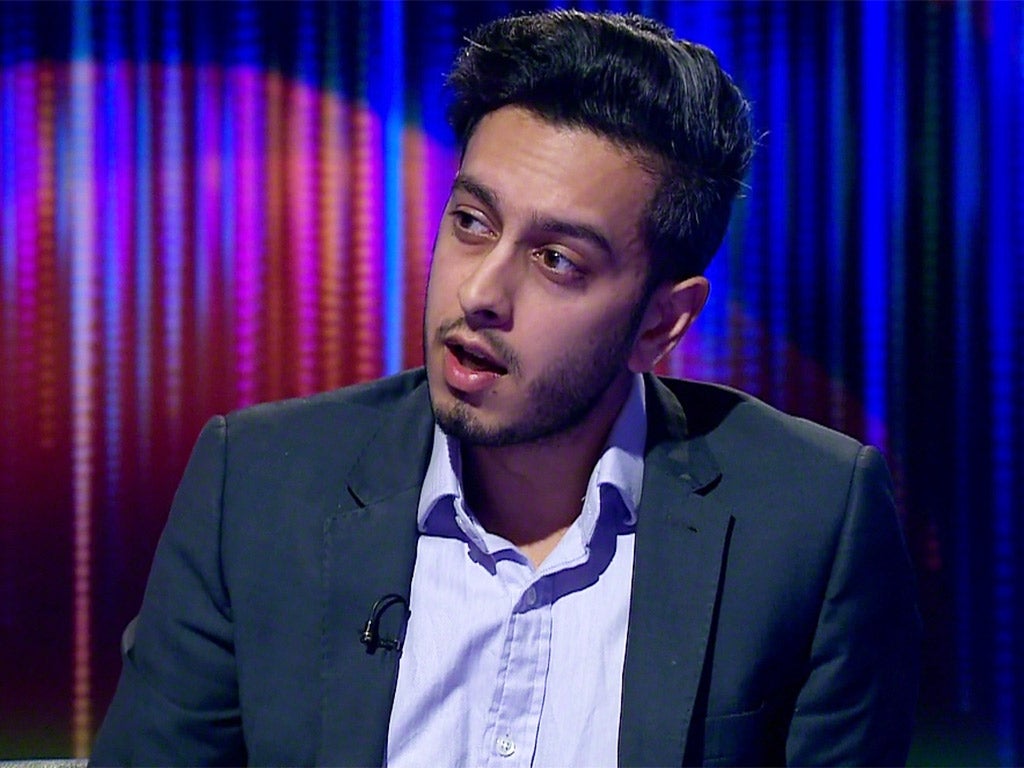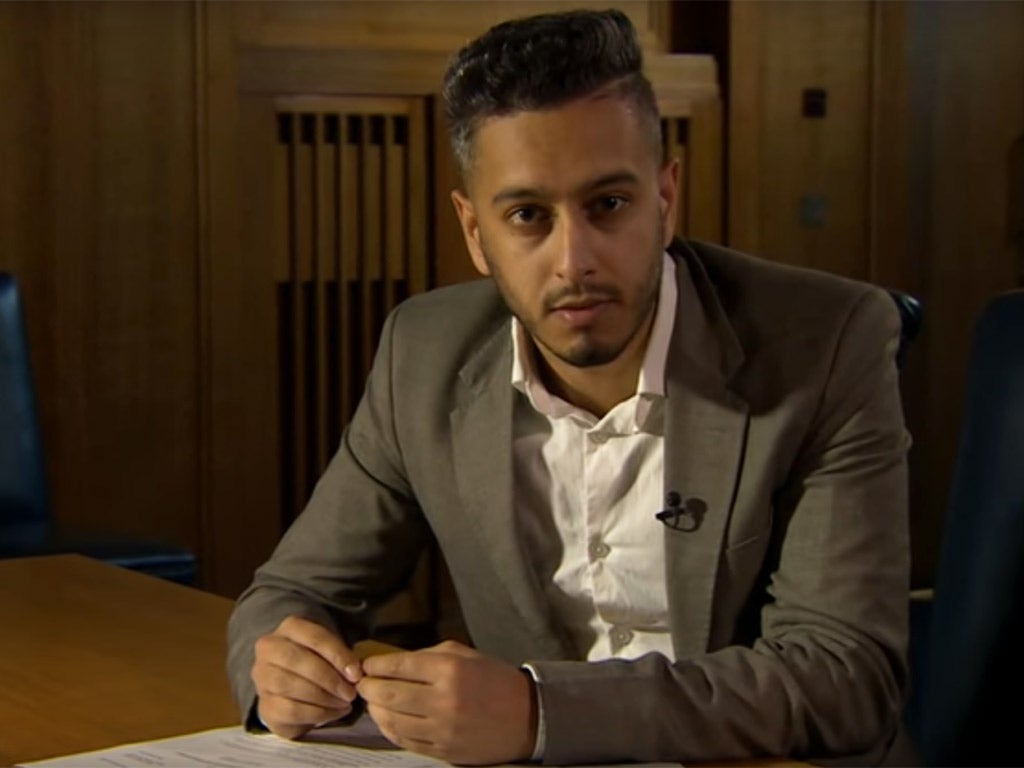Police use terror powers to seize BBC Newsnight journalist's laptop
Exclusive: Secunder Kermani joined the show early last year and has produced a series of reports on British-born jihadis

Police have used powers under the Terrorism Act to seize the laptop of a young Newsnight journalist in a case that has shocked BBC colleagues and alarmed freedom of speech campaigners, The Independent can disclose.
Officers obtained an order from a judge that was served on the BBC and Secunder Kermani, who joined the flagship BBC2 news show early last year and has produced a series of reports on British-born jihadis.
The development has caused alarm among BBC journalists. The editor of Newsnight, Ian Katz said: “While we would not seek to obstruct any police investigation we are concerned that the use of the Terrorism Act to obtain communication between journalists and sources will make it very difficult for reporters to cover this issue of critical public interest.”
There’s a chilling effect – I know material has not been published or broadcast because of anxiety to protect sources
A BBC spokesman said: “Police obtained an order under the Terrorism Act requiring the BBC to hand over communication between a Newsnight journalist and a man in Syria who had publicly identified himself as an IS member. The man had featured in Newsnight reports and was not a confidential source”.
Kermani has built a reputation for making contact with Western-born Isis fighters and interviewing them online about their motivations.
The seizure of his material has alarmed press freedom organisations. Jo Glanville, director campaign group English PEN, said the current “hysteria” around terrorism was greater than in the aftermath of the 9-11 and 7-7 attacks. “If journalists go near something to do with terrorism the police can use the Terrorism Act [2000] to go after their sources.”
The media lawyer Gavin Millar, QC, warned at a conference last month of the “looming problem” of police exploiting the wide-ranging terror legislation to go after journalistic sources at various news organisations. “There’s a chilling effect – I know material has not been published or broadcast because of anxiety to protect sources,” he has said. “We are talking notes, emails, video footage, audio [being seized]. I don’t think we are hearing the accounts of why young people are going [to Syria]. The debate has not been advanced by informed coverage because the media is in fear of the Terrorism Act.”

There are also concerns that police may attempt to use the legislation to go after sources of academic research into Islamic extremism. Kings College London’s International Centre for the Study of Radicalisation has built a huge data base of Western jihadists.
Last year the Newsnight journalist secured an online interview with Jake Bilardi, the Melbourne teenager who died in a suicide attack in Iraq which killed at least 17 people in March.
In a blog posted after Bilardi’s death, Kermani wrote that the Australian had been fast-tracked by Isis into becoming a suicide bomber. Bilardi told the BBC journalist: “I came here chasing death, I might as well kill as many kuffar as I can.” Kermani asked him if he had thought of the impact his death would have on his family in Australia. “I’ve got a job to do. I didn't come here to hand out roses and boxes of chocolates,” came the written response.
Kermani began his career at the Islam Channel, which has been criticised for carrying adverts for DVDs of the radical cleric Anwar al-Awlaki. The cleric has been linked to al-Qaeda and has called for Muslims to unite against the west. The channel has denied giving a platform to Al-Awlaki, and said they had not known that their website carried a link to the sermons, and that they had removed the link.
The journalist went on to work for Bloomberg News and BBC London before joining Newsnight in January 2014. He has secured a succession of interviews with jihadis including one in August last year in which a British Pakistani Isis fighter – also called “Awlaki” and named after the preacher – talked of Isis beheading its enemies, said he hated the UK and that he would only return to the country to “plant a bomb somewhere”.
Terrorism: The Law
Q | What legislation is being used?
A | Section 32 of the Terrorism Act 2000 deems any police inquiry into the “commission, preparation or instigation of acts of terrorism” to be termed a “terrorism investigation”, allowing far-reaching powers.
Q | How do the police obtain information?
A | By seeking an order from a judge, in the same way that they do under the Police and Criminal Evidence Act (Pace).
Q | What has changed?
A | An order has become far easier to obtain under the Terrorism Act. Section 1 of the Act allows for a wide-ranging definition of terrorist – this can be interpreted to include all UK citizens travelling to Syria who might be suspected of fighting President Bashar al-Assad’s regime. The public interest defence, used by news organisations to fight orders under the Regulation of Investigatory Powers Act (RIPA), carries little weight with Terrorism Act orders.
The report attracted criticism from the former Security Minister Dame Pauline Neville-Jones. “We can perfectly well be informed about their views and attitudes without giving them access to mainstream media on a corporation that has a reputation to preserve,” she said. “It gives them a degree of access and a status and importance they should not be accorded.”
Kermani spent months developing his contact with Awlaki and told viewers that the jihadi was “softly spoken” in their exchanges. The BBC defended its report saying it “offered insights” into Isis crimes.
Next month at the Court of Appeal, David Miranda, the partner of former Guardian journalist Glenn Greenwald, will challenge a ruling that he was lawfully detained at Heathrow airport under the Terrorism Act in 2013, resulting in the seizure of 58,000 highly-classified documents he was carrying for the journalist in encrypted files.
One BBC source said: “It think it makes it very difficult to do proper reporting in this territory when the cops can come in and get orders for material as easily as they can. The police have the authority to seize anything that they think will be of use to them in a terror investigation and that’s quite a wide net.”
Video: a recent report for Newsnight by Secunder Kermani
Source material: The price of protection
- Daily Mail reporter Brendan Mulholland and Reg Foster of the Daily Sketch were jailed for contempt of court – for six months and three months respectively – in 1963, after refusing to disclose their sources in reporting the Vassall spy tribunal.
- Sarah Tisdall, a Foreign Office clerk, was jailed in 1983 after anonymously sending The Guardian details of US cruise missile nuclear weapons arriving in Britain.
- The newspaper was ordered by the Attorney General to hand over the documents, which were identified as coming from a Foreign Office photocopier, and Ms Tisdall was charged under the Official Secrets Act.
- Former Independent journalist Jeremy Warner was fined £20,000 in 1988 after refusing to reveal his sources to Department of Trade and Industry inspectors investigating insider dealing in the City.
- In 2011, police obtained a court order which led to The Sunday Times identifying Vicky Pryce as its source in stories about her ex-husband, the former cabinet minister Chris Huhne. Ms Pryce was subsequently jailed for perverting the course of justice.
